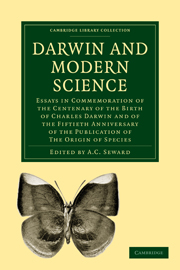 Darwin and Modern Science
Darwin and Modern Science Book contents
- Frontmatter
- PREFACE
- Contents
- LIST OF ILLUSTRATIONS
- DATES OF THE PUBLICATION OF CHARLES DARWIN'S BOOKS AND OF THE PRINCIPAL EVENTS IN HIS LIFE
- I Introductory Letter to the Editor from SIR
- II Darwin's Predecessors
- III The Selection Theory
- IV Variation
- V Heredity and Variation in Modern Lights
- VI The Minute Structure of Cells in Relation to Heredity
- VII “The Descent of Man”
- VIII Charles Darwin as an Anthropologist
- IX Some Primitive Theories of the Origin of Man
- X The Influence of Darwin on the Study of Animal Embryology
- XI The Palaeontological Record. I. Animals
- XII The Palaeontological Record. II. Plants
- XIII The Influence of Environment on the Forms of Plants
- XIV Experimental Study of the Influence of Environment on Animals
- XV The Value of Colour in the Struggle for Life
- XVI Geographical Distribution of Plants
- XVII Geographical Distribution of Animals
- XVIII Darwin and Geology
- XIX Darwin's work on the Movements of Plants
- XX The Biology of Flowers
- XXI Mental Factors in Evolution
- XXII The Influence of the Conception of Evolution on Modern Philosophy
- XXIII Darwinism and Sociology
- XXIV The Influence of Darwin upon Religious Thought
- XXV The Influence of Darwinism on the Study of Religions
- XXVI Evolution and the Science of Language
- XXVII Darwinism and History
- XXVIII The Genesis of Double Stars
- XXIX The Evolution of Matter
- INDEX
I - Introductory Letter to the Editor from SIR
Published online by Cambridge University Press: 07 September 2010
- Frontmatter
- PREFACE
- Contents
- LIST OF ILLUSTRATIONS
- DATES OF THE PUBLICATION OF CHARLES DARWIN'S BOOKS AND OF THE PRINCIPAL EVENTS IN HIS LIFE
- I Introductory Letter to the Editor from SIR
- II Darwin's Predecessors
- III The Selection Theory
- IV Variation
- V Heredity and Variation in Modern Lights
- VI The Minute Structure of Cells in Relation to Heredity
- VII “The Descent of Man”
- VIII Charles Darwin as an Anthropologist
- IX Some Primitive Theories of the Origin of Man
- X The Influence of Darwin on the Study of Animal Embryology
- XI The Palaeontological Record. I. Animals
- XII The Palaeontological Record. II. Plants
- XIII The Influence of Environment on the Forms of Plants
- XIV Experimental Study of the Influence of Environment on Animals
- XV The Value of Colour in the Struggle for Life
- XVI Geographical Distribution of Plants
- XVII Geographical Distribution of Animals
- XVIII Darwin and Geology
- XIX Darwin's work on the Movements of Plants
- XX The Biology of Flowers
- XXI Mental Factors in Evolution
- XXII The Influence of the Conception of Evolution on Modern Philosophy
- XXIII Darwinism and Sociology
- XXIV The Influence of Darwin upon Religious Thought
- XXV The Influence of Darwinism on the Study of Religions
- XXVI Evolution and the Science of Language
- XXVII Darwinism and History
- XXVIII The Genesis of Double Stars
- XXIX The Evolution of Matter
- INDEX
Summary
Dear Professor Seward,
The publication of a Series of Essays in Commemoration of the century of the birth of Charles Darwin and of the fiftieth anniversary of the publication of “The Origin of Species” is assuredly welcome and is a subject of congratulation to all students of Science.
These Essays on the progress of Science and Philosophy as affected by Darwin's labours have been written by men known for their ability to discuss the problems which he so successfully worked to solve. They cannot but prove to be of enduring value, whether for the information of the general reader or as guides to investigators occupied with problems similar to those which engaged the attention of Darwin.
The essayists have been fortunate in having for reference the five published volumes of Charles Darwin's Life and Correspondence. For there is set forth in his own words the inception in his mind of the problems, geological, zoological and botanical, hypothetical and theoretical, which he set himself to solve and the steps by which he proceeded to investigate them with the view of correlating the phenomena of life with the evolution of living things. In his letters he expressed himself in language so lucid and so little burthened with technical terms that they may be regarded as models for those who were asked to address themselves primarily to the educated reader rather than to the expert.
- Type
- Chapter
- Information
- Darwin and Modern ScienceEssays in Commemoration of the Centenary of the Birth of Charles Darwin and of the Fiftieth Anniversary of the Publication of The Origin of Species, pp. 1 - 2Publisher: Cambridge University PressPrint publication year: 2009First published in: 1909


